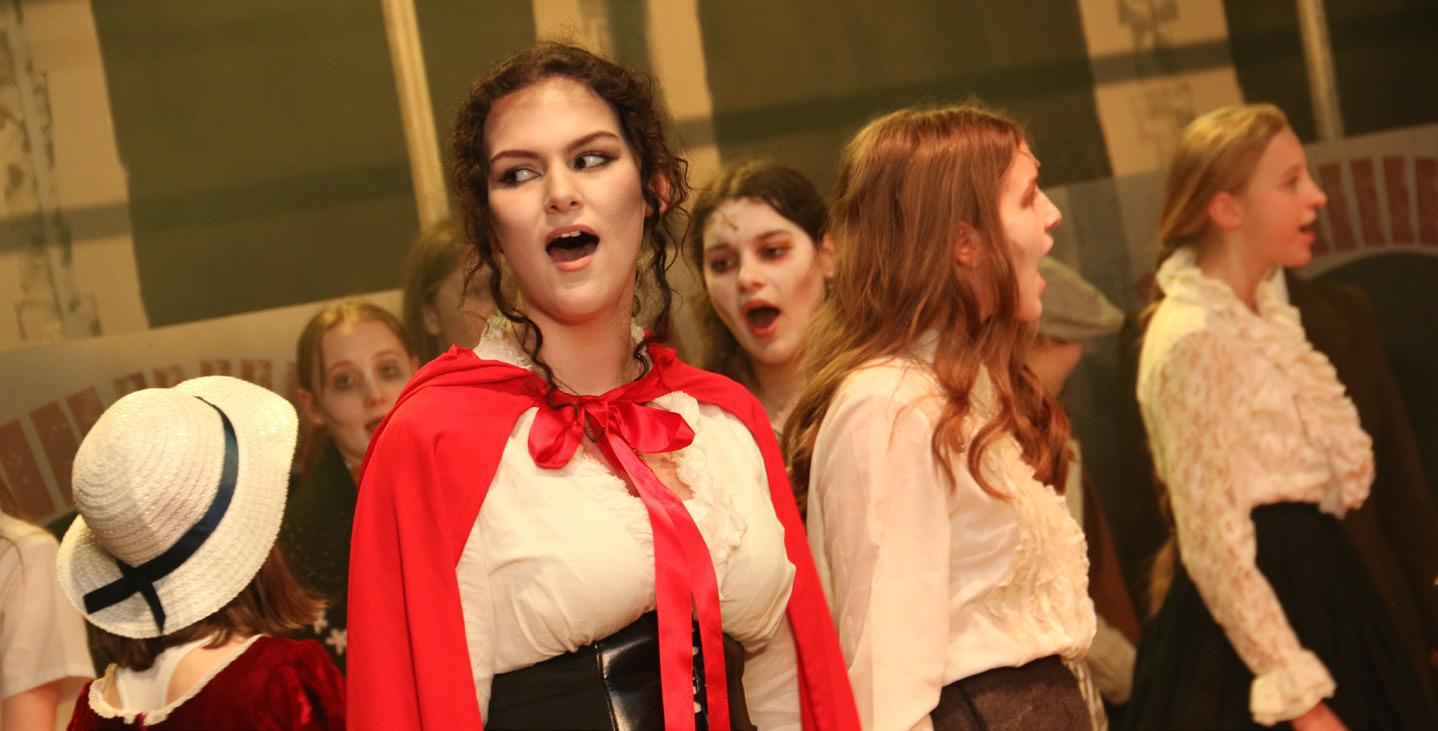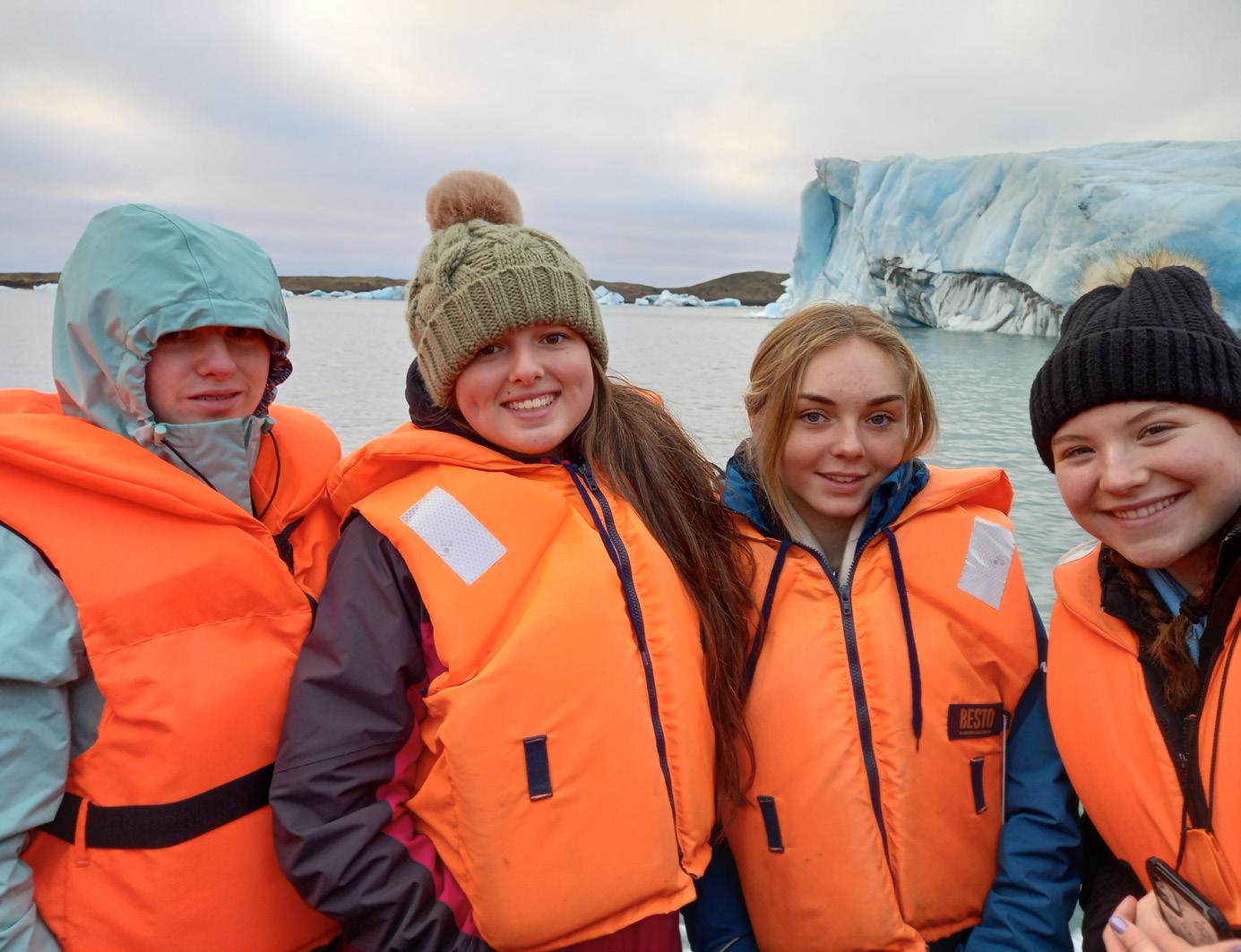
4 minute read
COURSES IN DETAIL
Drama
Head of Department: Mr T Scott Edwards
Advertisement
Email: tse@barneyschool.org.uk
Course name: GCSE Drama
Exam board: Eduqas (WJEC)
WHY DRAMA?
Studying a broad range of texts and practitioners will allow students to develop their performance skills, confidence and ability to approach sensitive material with a mature and insightful attitude, useful skills in all walks of life.
SYLLABUS CONTENT:
This is an exciting GCSE (9-1) course which offers students the opportunity to create fresh and challenging original theatre, as well as interpreting classic texts – 60% of the course is assessed via practical work, both internally assessed and externally moderated.
The written paper requires students to respond to a complete drama text, as well as a variety of live theatre experienced throughout the course. Through their studies, students will appreciate a variety of practitioners & genres, as well as looking at a variety of historical, cultural and social contexts, and work collaboratively to develop ideas to communicate meaning and experiment with dramatic conventions, forms and techniques to produce and realise original theatre.
This syllabus encourages the exploration of wider universal issues, including race, gender and identity, LGBTQIA+ concerns and globally political themes. Drama promotes students’ understanding of themselves as individuals, and the world around them.
ASSESSMENT:
Component 1: Devising Theatre
Non-exam assessment, internally assessed, externally moderated (40% of qualification)
Students are required to devise an original piece of theatre in response to a stimulus, using the techniques of either an influential practitioner or characteristics of a genre. They will produce a realisation of the piece, a portfolio of supporting evidence of the process, and a written evaluation of the final performance or design.
Component 2: Performing from a Text
Non-exam assessment, externally assessed (20% of qualification)
Students study two extracts of a text within the context of the whole, and participate in one performance using sections of the text from both extracts.
For Component 1 & 2, candidates can develop acting and/or design skills
Component 3: Interpreting Theatre
Written examination, 1hr30 (40% of qualification)
A series of questions on a set text, and a live theatre response question.
Geography
Head of Department: Mr David Dalton
Email: dwd@barneyschool.org.uk
Course name: GCSE Geography
Exam board: AQA
WHY GEOGRAPHY?
This course offers engaging and topical content through a stimulating blend of contemporary and traditional topics, with even coverage of both Physical and Human Geography.
Students will study physical processes and how they produce diverse and dynamic landscapes over time. They will learn about the interdependence of physical environments and the interactions between people and the environment. Fieldwork is undertaken throughout the course with trips to Swaledale, York and the Lake District.
Geography students will also have the opportunity to visit Iceland in Year 11. This is not a compulsory part of the course, however.

Geography develops a wide range of transferable skills such as numeracy, literacy and ICT. These skills are used whilst studying a variety of interesting topics. Geographers have a large number of careers open to them including, management, finance, and teaching. A GCSE in Geography keeps many doors open for the future and we are very proud of the achievements of our past students.
SYLLABUS CONTENT:
Paper 1: Living with the Physical Environment.
Natural Hazards, The Living World: Ecosystems, Hot Deserts and Cold Environments.
Paper 2: Challenges in the Human Environment.
Urban Issues and Challenges. The Changing Economic World. Resource Management.
Paper 3: Geographical Application.
Issue Evaluation. Fieldwork Skills. Geographical Skills.
ASSESSMENT:
Paper 1: Living with the Physical Environment. 35% of the GCSE
Paper 2: Challenges in the Human Environment. 35% of the GCSE.
Paper 3: Geographical Application. 30% of GCSE
History
Head of Department: Mr Dan Gorman
Email: dsg@barneyschool.org.uk
Course name: IGCSE History
Exam board: CIE (Cambridge International Examinations)
WHY HISTORY?
People who study History are fearless explorers of the past. They investigate past politics, societies, cultures, languages, health, art, education, economics, conflicts and more. History helps us tell the future by teaching us about the past. By analysing past events, we learn about the consequences of people’s actions and, we hope, try not to make the same mistakes next time around.
History teaches us to ask two particularly important questions: why and how? This is key to sharpening our critical thinking abilities which combine the following skills: analysis, research, extended writing, communication and problem solving.
Qualifications in History can lead to a wide variety of future careers, including Law, Politics, Public Sector, Business Management & Marketing, Economics, Teaching & Academia, Archaeology.
SYLLABUS CONTENT:
This course looks at some of the major international issues of the twentieth century, as well as covering the history of regions (Germany and Russia) in more depth. The emphasis is on both historical knowledge and on the skills required for historical research.
Students will develop an understanding of the nature of causes and effect, continuity and change, similarity and difference, and find out how to use and understand historical evidence as part of their studies.
Specific areas of study include:
Core Content
• The Treaty of Versailles at the end of World War I
• The work of the League of Nations in the 1920s and 1930s
• Hitler’s foreign policy and the causes of World War II
• The start of the Cold War, 194550
• The USA and attempts to control the spread of communism, 1950-75
• The Soviet Union and control over eastern Europe, 1948-1990.
Depth Studies
• Russia, 1905-41: the collapse of the Tsarist regime and the rise of communism
• Germany, 1918-45: the impact of WWI, the rise of Hitler and the nature of the Nazi State.
ASSESSMENT:
Paper One (40%):
This tests the core content and the Germany Depth Study. Each question is structured into three parts and requires factual knowledge along with the ability to produce extended explanations for key historical events and developments.
Paper Two (30%):
This is a source-based paper on a specified topic area – for 2025, the topic will be: To what extent was the League of Nations a success? There are seven sources (written and visual) with five questions to answer.
Coursework (30%):
At the start of Year 11, students complete an extended essay (2000 words) on the impact of Stalin on Russia and the Russian people in the 1930s.







